Welcome to the official face-off, Ahrefs against Semrush. Digital marketers trying to increase their online presence turn to these explosive search engine optimizers. But choosing between the two can be difficult given Ahrefs’ strong backlink analysis and Semrush’s wide keyword research powers.
Deeply exploring the features, strengths, and trade-offs of both products, this thorough comparison We’ll look at:
- Finding the best chances for link-building in backlink analysis.
- Finding the most lucrative keyword ideas is the keystone research.
- Analyzing your rivals’ tactics will help you to learn from the ones guiding their success.
We will also discuss how Plerdy’s UX & CRO research might enhance the advantages your selected SEO tool offers.
Remember, the “best” tool is the one that fits your business demands and matches your objectives rather than any one else. So get ready as we reveal the power of Ahrefs and Semrush to guide your decisions!
Importance Of Understanding Your SEO Needs Before Choosing A Tool
Negotiating the terrain of SEO might feel like exploring uncharted ground. Understanding your particular needs before choosing a tool—Ahrefs, SEMrush, or any other—is therefore absolutely vital. Here are the reasons:
- SEO tools are not one-size-fits-all. Each has unique qualities and strengths. Pinning your needs helps you to match them with the appropriate instrument so guaranteeing a customized approach.
- Cost-effectiveness: SEO instruments are sold in several price points. Understanding your needs helps you to avoid paying for pointless extras, so optimizing the cost of your investment.
- Clear knowledge of your needs will help you to fully employ your selected tool, so opening the path for a targeted and successful SEO campaign.
Take a local company trying to increase its web presence, for example. Their demands can be local keyword tracking and competitive analysis first. Here they might use SEMrush, known for its extensive competitor analysis tools.
Alternatively, Ahrefs’ strong backlink analysis and broken link finding would help a content-based website seeking for top-tier backlinks.
Knowing your needs helps you to find the best fit SEO tool like a compass. It guarantees you are selecting an ally for your digital path rather than only a tool. The correct instrument will help you to turn the tide in your advantage and make the difficult field of SEO manageable. With careful thought, you’ll be well on your way to land top results on the SERPs without working too hard.
What is Ahrefs?
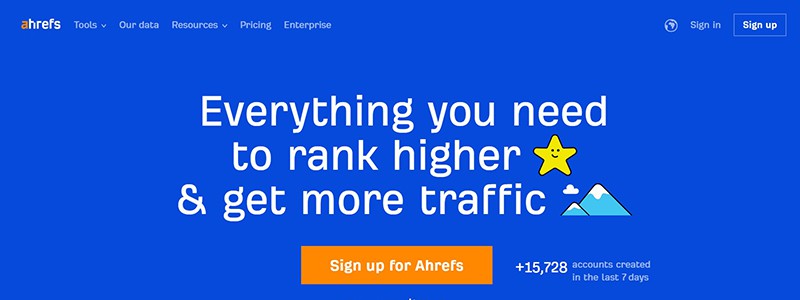
Introducing Ahrefs, a tool for SEO excellence powerful. This strong platform keeps you ahead of the competitors and helps you shape your digital presence.
Ahrefs shines brilliantly with its many capabilities:
- Ahrefs has a large keyword database that will enable you to find the finest lines of attack.
- Ahrefs let you explore the backlink profile of any website, thereby revealing chances to create your own link portfolio.
- Content Exploration: With insights for your content strategy, the tool lets you find excellent material in your field.
- Using Ahrefs’ exact rank tracker, monitor the search engine performance of your site.
Consider an online shoe business trying to increase its internet presence for a real-life picture. Ahrefs allows the company to find top-performing material surrounding footwear fashion to influence their blog approach, locate high-volume keywords like “summer sandals,” and examine competitors’ backlink profiles for outreach possibilities.
Ahrefs also watch the performance of the store’s website for specified keywords, so offering useful information for SEO changes.
Ahrefs is a multifarious SEO tool meant to empower your internet presence very subtly. It’s like having a magnifying glass revealing the minute elements of the SEO terrain so you may create a strong, data-driven plan. One clicks at a time, using Ahrefs helps you to master the digital realm rather than only negotiate it.
What is Semrush?

With Semrush, a flexible tool meant to maximize your online success, dive into the SEO ocean. This dynamic platform gives you complete capabilities to accurately guide your digital strategy.
Semrush excels in numerous spheres:
- Keyword Magic Tool: Find top-notch keywords in your niche to drive search engine friendly content for your page.
- Semrush lets you see how your rivals approach things, thereby helping you to improve your own.
- Site Audit: This tool helps you keep a clean, search engine optimized website by sweeping your website for any SEO bugs.
- Track your social media activity and get practical ideas to increase your profile.
Consider a young fitness blog hoping to establish itself. Semrush allows them to routinely check their site to guarantee best performance, search for untapped keywords like “home workout tips,” and glimpse at the SEO strategy of effective fitness blogs. Also quite helpful for evaluating their social media activity will be the social media tracker.
Semrush is, all things considered, a power-packed SEO tool ready to improve your web presence. Like a Swiss Army knife of SEO, ready to handle all aspect of your online plan. Semrush allows you to be speeding toward the finish line, leaving rivals in your wake rather than just running the digital race. Semrush delivers the ability of data-driven strategy right at your hands, a real friend for your digital climb.
Ahrefs vs. Semrush: Keyword Research Capabilities
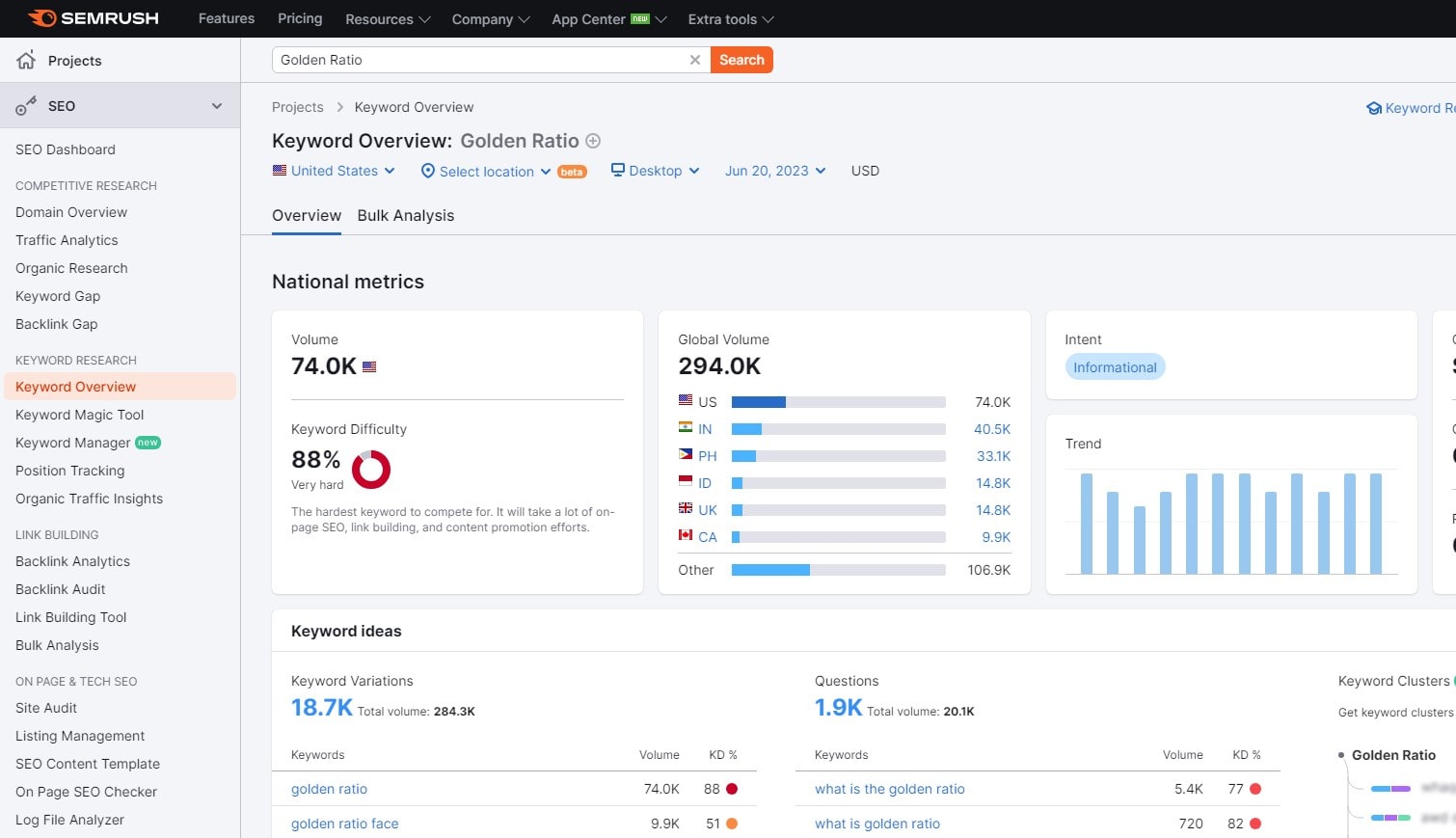
Welcome to the battle—Ahrefs against Semrush in terms of keyword research capability. Though they have different strengths, both are explosive SEO tools.
Ahrefs offer:
- Ahrefs takes great satisfaction in having a large keyword database, which offers a rich source of keyword discovery.
- Keyword Difficulty Score: It provides a keyword difficulty score, therefore determining a keyword’s competitiveness.
- Ahrefs provides click statistics in addition to search traffic, therefore illuminating user activity.
Now let’s focus on Semrush:
- Semrush’s Keyword Magic Tool reveals a multitude of keywords broken out into several topic clusters.
- It increases your search scope by including related keywords, questions, and variations of keywords.
- Semrush provides a thorough SERP study for every keyword, so providing understanding of the current competitive scene.
Imagine a startup skincare company trying to increase its web profile. Ahrefs give a difficulty score, search high-volume keywords like “organic skincare,” and click statistics to guide their content strategy. Semrush might, however, help them find more diverse keywords, variants, and thorough SERP analysis to grasp their competition.
Though in various strengths, Ahrefs and Semrush provide strong keyword research tools. Whatever instrument you use, it’s about matching its capabilities with your SEO plan, therefore opening the road for a customized, data-driven method to negotiate the SEO terrain.
Ahrefs vs. Semrush: Backlink Analysis
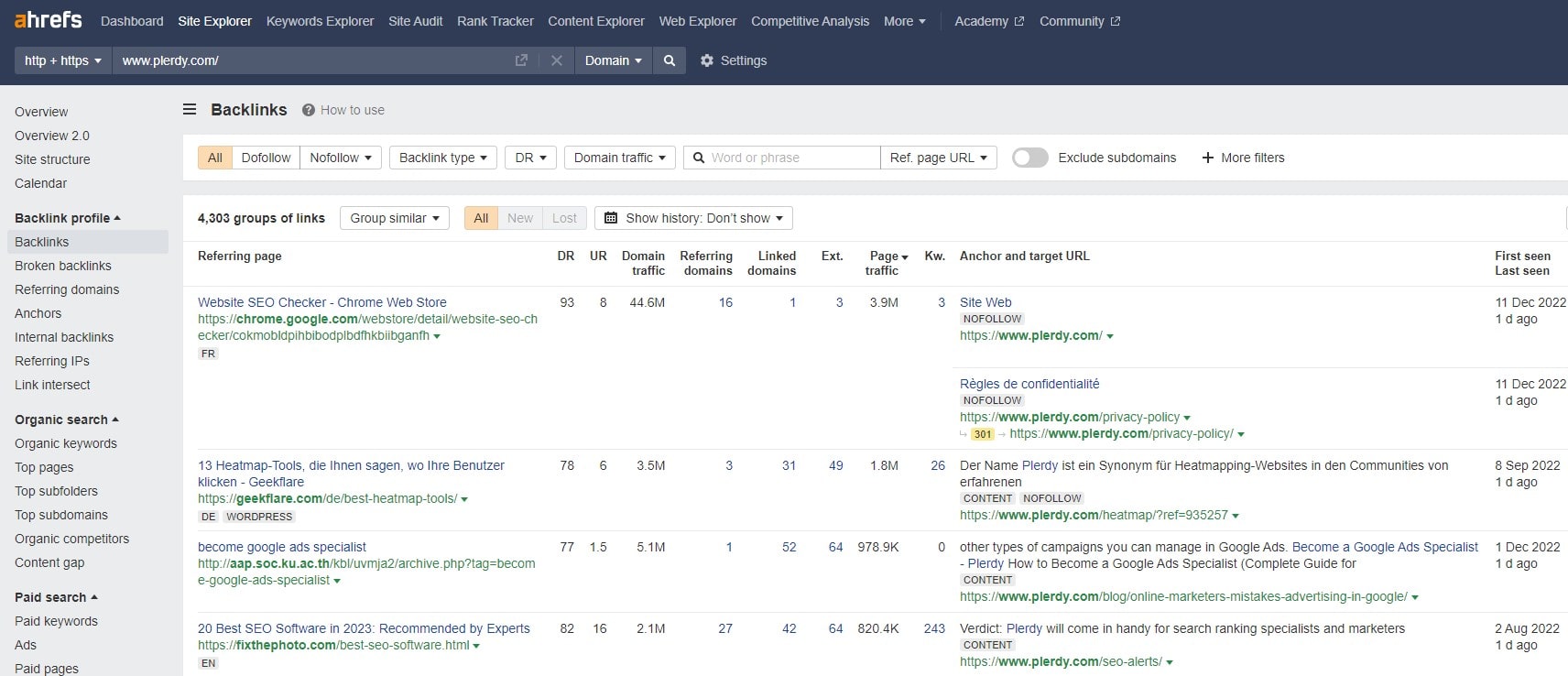
Revealing Ahrefs and Semrush’s backlink analysis powers, a fundamental aspect of SEO. These two powerhouses have special tools for exposing the backlink terrain.
Choosing Ahrefs helps you to:
- Ahrefs presents a whole picture of your backlink profile, therefore clarifying your link portfolio.
- Recent and Missing Backlinks: Monitoring your link-building development closely, track the ebb and flow of your backlinks.
- Discover damaged links and grab the chance to restore priceless link juice.
Turning now to Semrush, you gain from:
- Semrush provides a thorough backlink assessment including possibly dangerous links.
- Compare your profile with rivals to identify unexplored link-building prospects using the Backlink Gap Tool.
- Knowing the variety of your anchor text can help you to create a good link profile.
Consider a digital magazine trying to improve its link profile for example. Ahrefs might, for instance, show a thorough summary of their present backlinks, point up any broken links, and emphasize both new and lost links. Semrush might meanwhile evaluate the variety of its anchor text, find new link possibilities, and look for negative links.
All things considered, Ahrefs and Semrush shine in backlink analysis and provide different set of features. The ideal option for your specific SEO needs will depend on how well its advantages match those needs. The correct tool will help you to create a strong link profile and confirm your internet presence.
Ahrefs vs. Semrush: Site Audit Capabilities
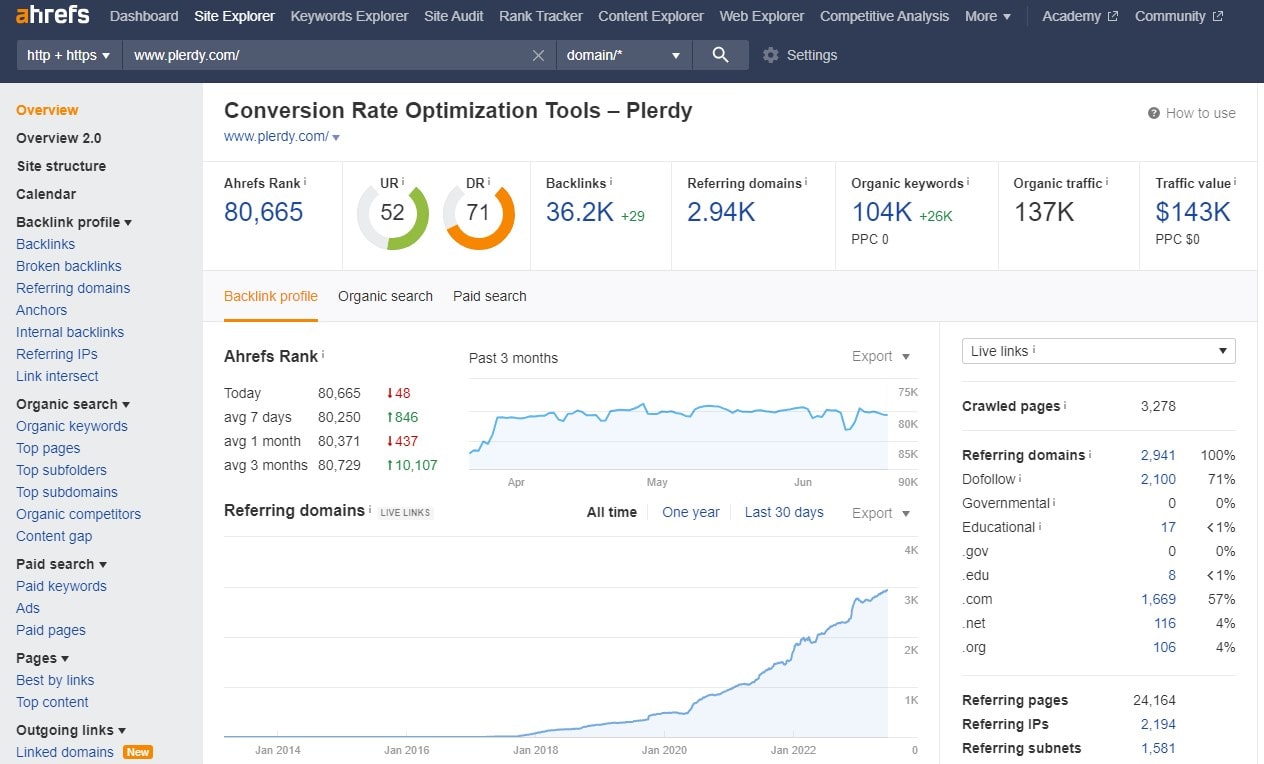
Negotiating the field of site audit capabilities, Ahrefs and Semrush are two SEO giants. Every tool has a different way to monitor the condition of your site.
Choosing Ahrefs will yield:
- Ahrefs offers a thorough site audit tool to assist find on-page search engine optimization problems.
- Visual charts showing the health of your site over time will help you to understand data.
- Ahrefs reveals your internal link structure, thereby guaranteeing best link equity allocation.
Conversely with Semrush, you access the following:
- Semrush is a comprehensive site assessment tool meant to identify possible SEO problems.
- By grouping audit findings into topic reports, it simplifies problem prioritizing.
- Semrush provides a site health score that quickly summarizes the state of your website.
Consider an online retailer trying to maximize its website. Ahrefs can examine internal linking structure, graphically show its health over time, and offer a complete site assessment. Semrush could simultaneously provide an overall site health score for a quick view of the site’s SEO, theme reports for simple issue fixing, and a thorough site assessment.
In the end, each with special qualities, Ahrefs and Semrush offer outstanding site audit capability. The decision depends on matching their capabilities to certain SEO requirements. Equipped with the correct instrument, you are ready to maintain the optimal state of SEO for your website.
Ahrefs vs. Semrush: Competitive Analysis
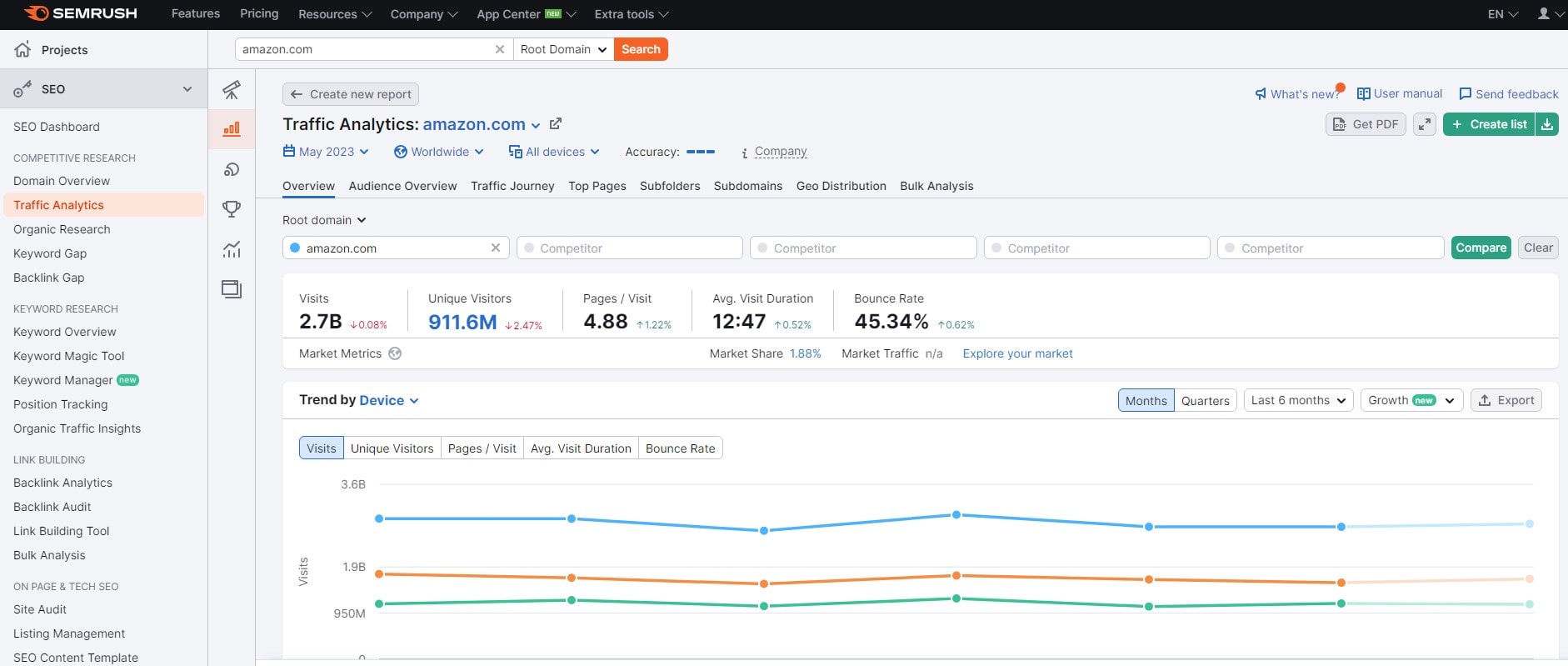
In the often changing terrain of SEO, success often depends on knowing the techniques of your rivals. Features of Ahrefs and Semrush provide competitive analysis tools to keep one step ahead.
Turning towards Ahrefs, you can:
- This tool finds your SEO competitors using common keywords.
- Content Gap: This tool reveals keywords you rivals score for, but you do not.
- Link Intersect: This tool finds sites linking to your rivals but not to you.
Turning now to Semrush, you can take advantage of:
- Domain vs. Domain: This tool straight compares your website with your rivals.
- Keyword Gap: This tool shows keywords your competitors score.
- This tool shows websites connected to your rivals but not to you, backlinks gap.
Consider a local bakery trying to surpass other local bakeries in the city. By use of Ahrefs, they may find their primary SEO rivals, explore content prospects, and find possible paths of link development. Concurrent using Semrush, they could directly compare their website with those of their rivals, find unexplored keywords, and spot backlinking potential.
In essence, Ahrefs and Semrush excel in competitive analysis and have unique characteristics. Your decision should coincide with your particular SEO objectives and the most effective techniques you come across. These strong instruments will help you ascend the SEO ladder and beat your rivals.
Ahrefs vs. Semrush: Pricing
In the cutthroat field of SEO, the cost of tools like Semrush and Ahrefs may either make or break a choice. So let’s dissect the specifics: just facts; no fluff.
For a single user, Ahrefs’ pricing plan runs from a meager $99 monthly; for an agency with up to five users, it runs from a hefty $999. Simply said: no hidden fees, no unanticipated expenses.
Semrush does, however, have three plans: Pro at $99.95, Guru at $199.95, and Business at $399.95 each month. Though the difference seems small, over time that additional 95 cents might accumulate.
To sum it up:
- Ahrefs:
- Lite: $99 per month
- Standard: $199 per month
- Advanced: $399 per month
- Agency: $999 per month
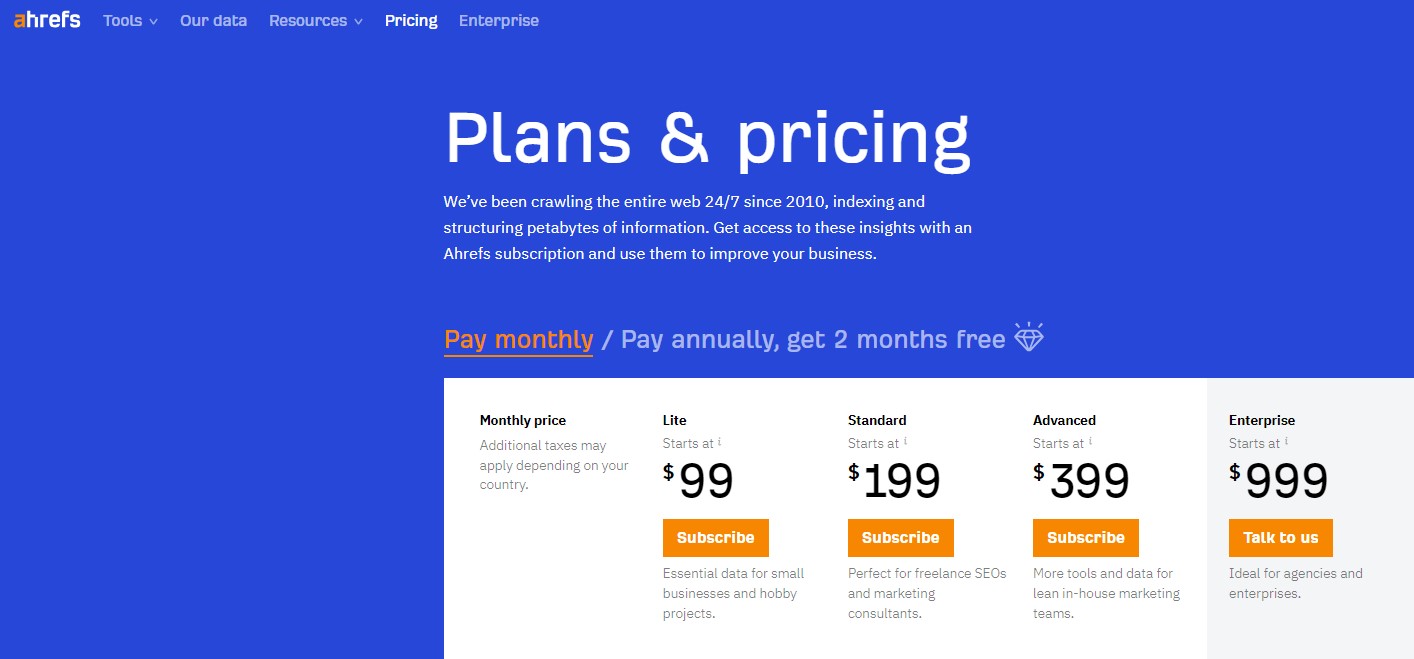
- Semrush:
- Pro: $119.95 per month
- Guru: $229.95 per month
- Business: $449.95 per month
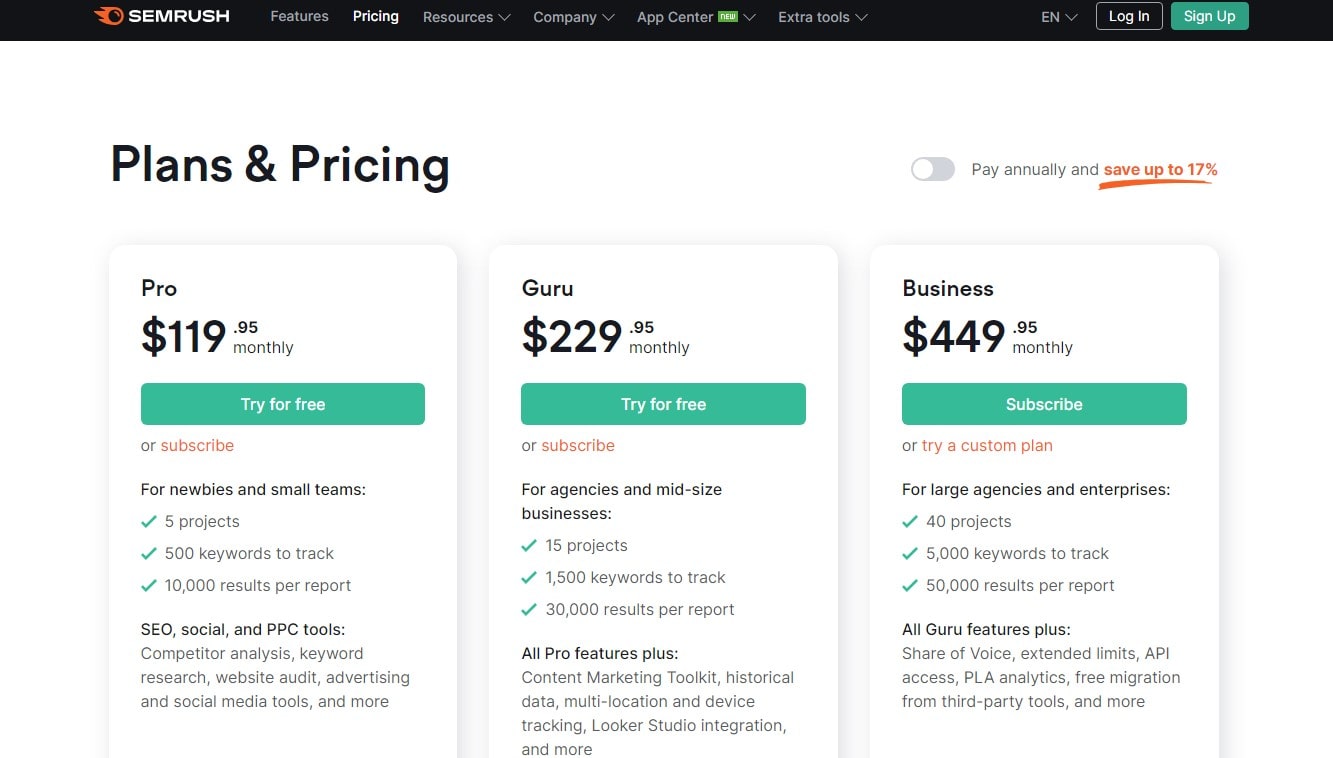
In search engine optimization, every dollar matters. You are making investments in a tool that might raise the ranking and visibility of your website. So give these things serious thought. Whether you run a one-person band or an agency, Ahrefs and Semrush provide a selection of rates to fit your particular requirements. It’s all about striking the ideal mix for your particular SEO path between expense and usefulness.
Ahrefs vs. Semrush: User Interface and Usability
Regarding SEO tools, Ahrefs and Semrush both provide insightful analysis albeit their user interface and usability differ. Let us therefore explore their special qualities:
- Semrush: Semrush shines out with so much in-depth keyword data. This tool delivers data on search volume trends and many results in addition to CPC, search volume, and competitiveness. Although this abundance of data could result in a rather messy interface, it’s a gold mine for individuals who have to quickly review many phrases.
- Ahrefs: With their main keyword research tools, Keyword Explorer and Organic Keywords, Ahrefs provide a simplified approach. Its interface emphasizes clear design and stresses on important measurements above minute details. For consumers who appreciate rapid access to the main indicators without further clicks, this makes Ahrefs very useful.
Regarding general user-friendliness, it is a close run. Though Ahrefs’ simpler UI makes it an easy-to-use tool, especially for backlink research, Semrush’s complete data could be a win for careful study.
Let’s compile the salient features:
- Semrush offers a lot of information, although the UI could seem disorganized.
- Ahrefs boasts a simpler, more elegant UI.
- For thorough keyword research, semrush is best.
- Ahrefs excel in understandable backlink analysis.
In the end, both instruments shine in their own right; the decision between Ahrefs and Semrush relies on personal preferences and need.
Ahrefs vs. Semrush: Customer Support
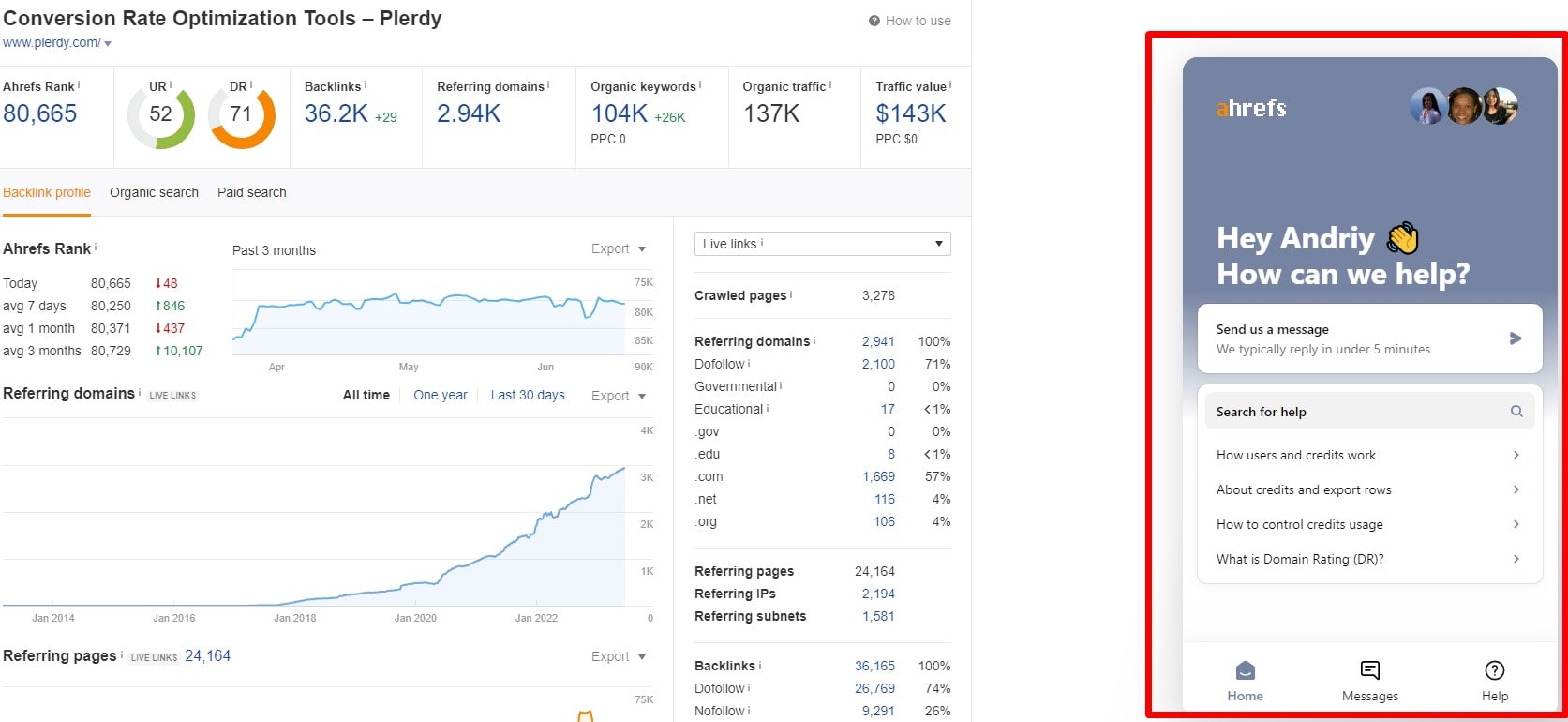
Regarding SEO tools, Ahrefs & Semrush are first-rate options. Their client service, nevertheless, is what distinguishes them.
Ahrefs presents a strong knowledge base, a wealth of detailed instructions and SEO advice. Fast on their feet, they use their built-in chat or email to solve your issues. Ahrefs can be a little lacking, though, if you want a more personal touch; they do not provide phone help.
By contrast, SEMrush towers with its multi-channel support system. Like Ahrefs, they have an email and live chat; but, they also offer direct phone assistance. They grab the phone fast and walk you through any SEO tempest. Their vibrant community forums and webinars also offer a level of expertise not found in the sector.
- Ahrefs: Email and chat support; thorough knowledge base; no phone assistance but other than this.
- Along with community forums and webinars, SEMrush covers email, chat, and phone support.
Consider a sophisticated keyword research conundrum. Ahrefs will probably discover an article or video guide to help you figure everything out. SEMrush provides a more hands-on approach, maybe guiding you around the process over the phone or in a forum discussion.
Ahrefs might be your best friend if self-guided learning fits your approach. For individuals who would want a more engaged support experience, nonetheless, SEMrush could be the best option.
Which Tool Is Best for Rank Tracking?
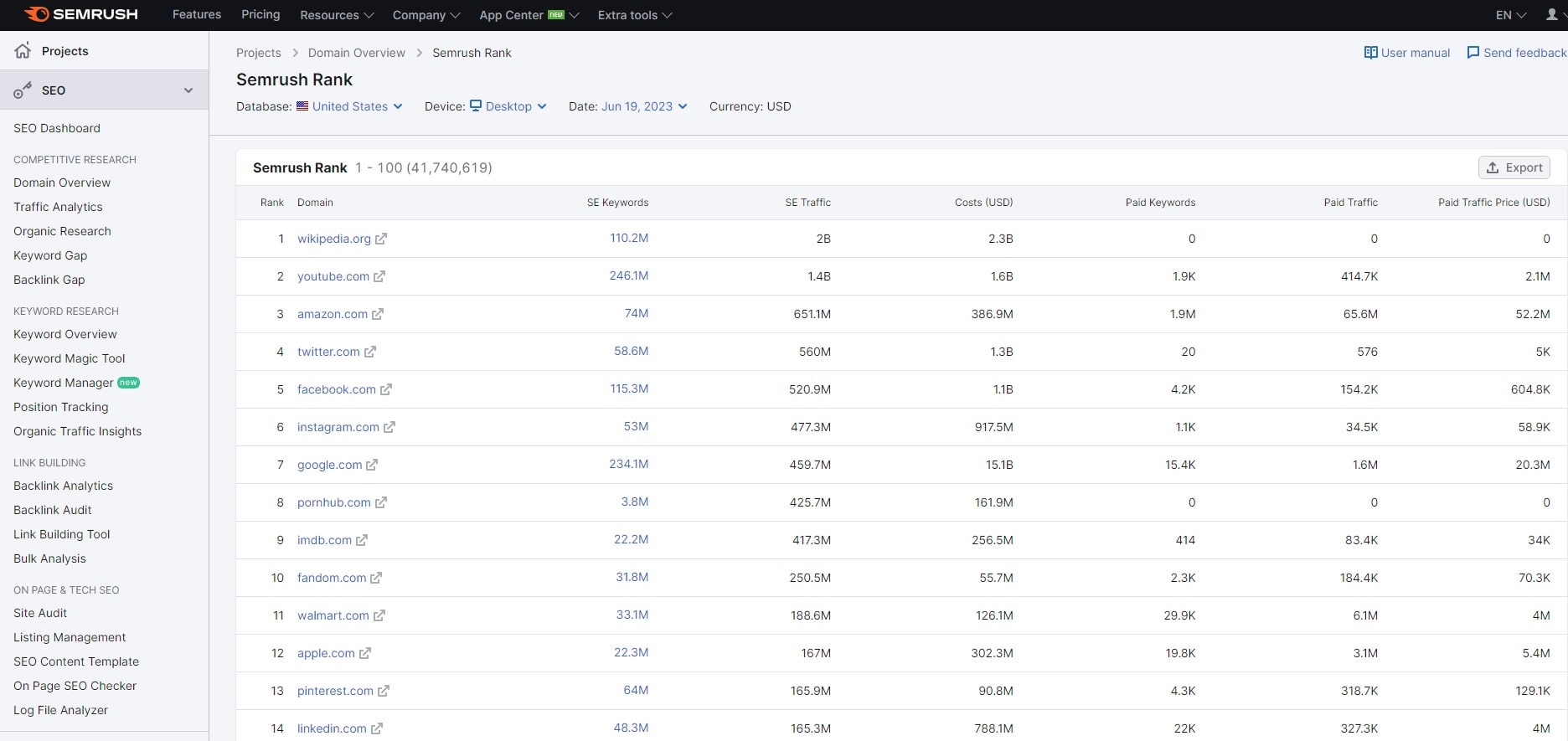
Choosing Ahrefs or Semrush for rank tracking can feel like negotiating a feature maze. Although both instruments have great features, let’s concentrate on their ability for rank-tracking:
- Ahrefs’ Rank Tracker lets you keep an eye on how SERP performance of your website is tracked holistically. All daily updated, the elegant dashboard provides averages on average position, visibility, and keyword ranks.
- Semrush, on the other hand, advances rank tracking a bit. Apart from daily updates, it provides a lot of competitive statistics displaying your performance versus your opponents.
For those who wish to monitor their SEO development, Ahrefs provides a comprehensive picture of the keyword results of your website, thereby acting as a trustworthy tool. Semrush’s Position Tracking tool might be your finest choice, but, if you want an edge in your rivals.
Consider a neighborhood bakery hoping to rank for “artisanal bread.” Ahrefs will indicate how the keyword performs; Semrush goes farther to expose rivals fighting for the same term. This degree of detail could be exactly right.
For rank tracking, then, weigh your needs against Ahrefs and Semrush. Ahrefs might be your first choice for a concise, basic summary. Semrush might, nevertheless, be your golden ticket for a thorough, competitive study.
Which Tool Has Cool Unique Features?
Among the SEO tools, Ahrefs and Semrush stand out for their special qualities in the scene. Whether your level of experience with SEO is new or seasoned, these tools provide capabilities that could simplify your work on it.
The Content Gap Tool in Ahrefs lets you find the terms rivals rank for. Imagine you operate an online plant store. Ahrefs’ Content Gap Tool helps you find terms like “indoor air purifying plants your rivals are using,” but you still need to make use of. Like discovering a secret treasure box of SEO prospects!
Semrush dazzles with its Keyword Magic Tool on the other hand. This tool creates comprehensive keyword lists with search traffic, match kinds, and competitiveness statistics. Consider it: strapped for keyword ideas, you run a fitness blog. Add “workout” to the Keyword Magic Tool, and presto you have an avalanche of pertinent keywords ranging from “home workouts” to “workout plans for beginners.”
Basically, Ahrefs and Semrush provide their special appeal to the SEO scene. Ahrefs might be your best friend if you want to find unrealized keyword potential. Semrush might be your ideal fit, though, if you need a magic wand for keyword inspiration.
Alternatives To Ahrefs And Semrush
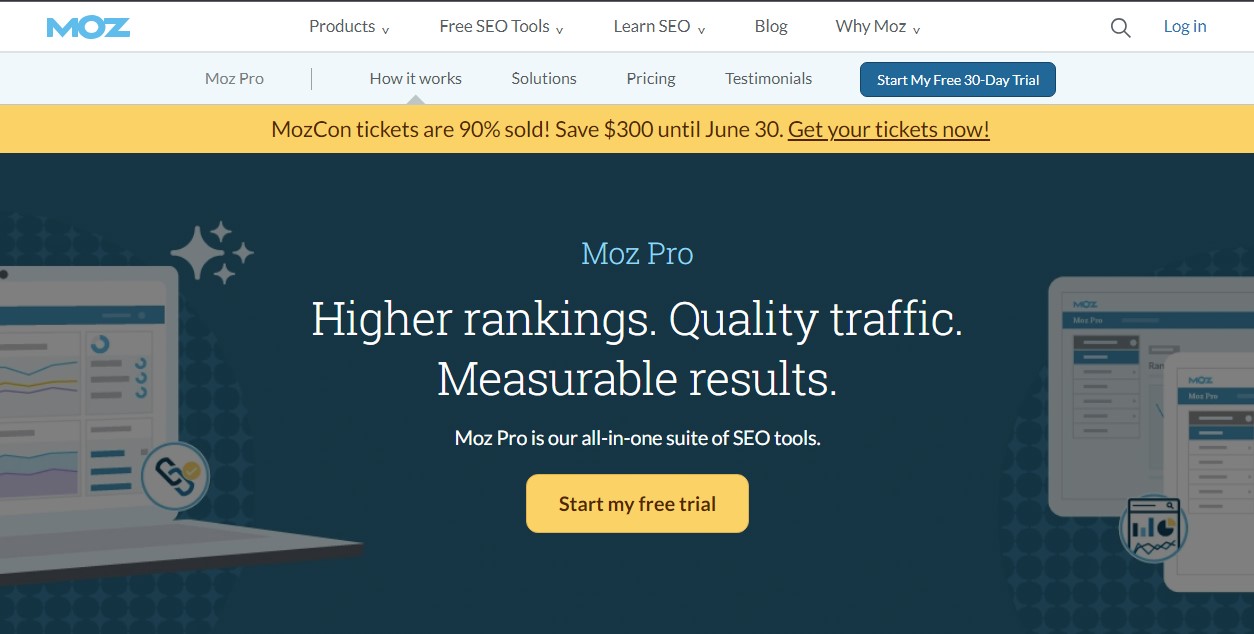
Ahrefs and Semrush are the stars in the realm of SEO tools. Still, certain deserving substitutes have special advantages:
- Moz Pro presents an all-in-one SEO toolkit. Moz Pro covers site audits as well as keyword research. Consider a young digital marketer trying to maximize a website for search engines; Moz Pro offers thorough statistics and suggestions to help to simplify the work.
- Serpstat is another great substitute. It shines in competitor research and keyword study. A tiny business, for instance, is seeking to become well-known in a saturated market. Serpstat can enable the company create a strong search engine optimization plan.
- In backlink analysis, Majestic shines. Majestic’s thorough backlink data is quite helpful for a website owner looking to know the link profile of his domain.
Although Ahrefs and Semrush are leaders in their field, many qualified substitutes are available. Moz Pro, for instance, has a strong, all-around toolkit; Serpstat gives great keyword and competitor intelligence; Majestic shines in backlink research. Therefore, the correct tool for your particular SEO requirements—whether you decide on Ahrefs, Semrush, or another—fits like a glove.
Ahrefs G2 Reviews
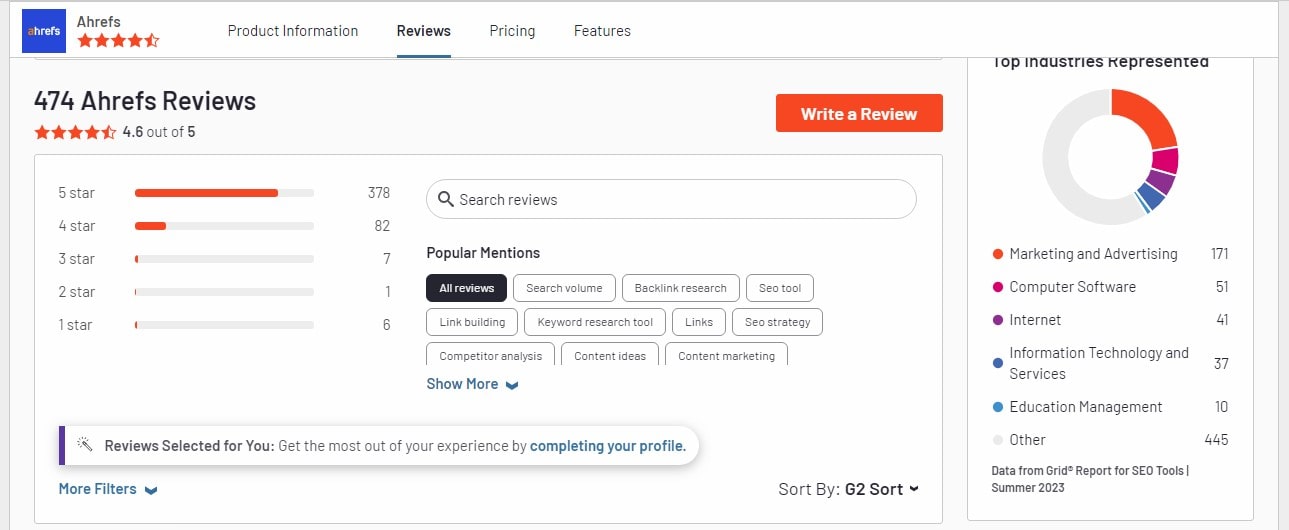
Use Ahrefs to fuel your SEO plans. Having a 4.6/5 rating from 469 people on G2, this is a strong digital marketing tool. Particularly in marketing, advertising, and computer software, a must-have for managers of marketing and digital media. Everyone is covered since small enterprises (64%) and mid-market (29%) are somewhat present.
Harness these strong qualities to boost your SEO:
- Find out from natural to PPC competitor SEO techniques.
- Find the most powerful backlink prospects for your niche.
- Research keywords to unlock several pertinent ideas and estimate your ranking power.
- Find and fix SEO problems on your website in the audit.
- Research material to find the most popular across several subjects to guide your own.
- Track your search results as well as those of your competitors.
- Email alerts for internet references of you or your brand can help you to remain vigilant.
With over 11 billion keywords and 400 billion indexed pages in its vast database, Ahrefs guarantees highest data accuracy for its consumers. Using a subscription tier or the free entry-level price point, it runs exactly alongside SEMrush and is a complete powerhouse in SEO tools.
Semrush G2 Reviews
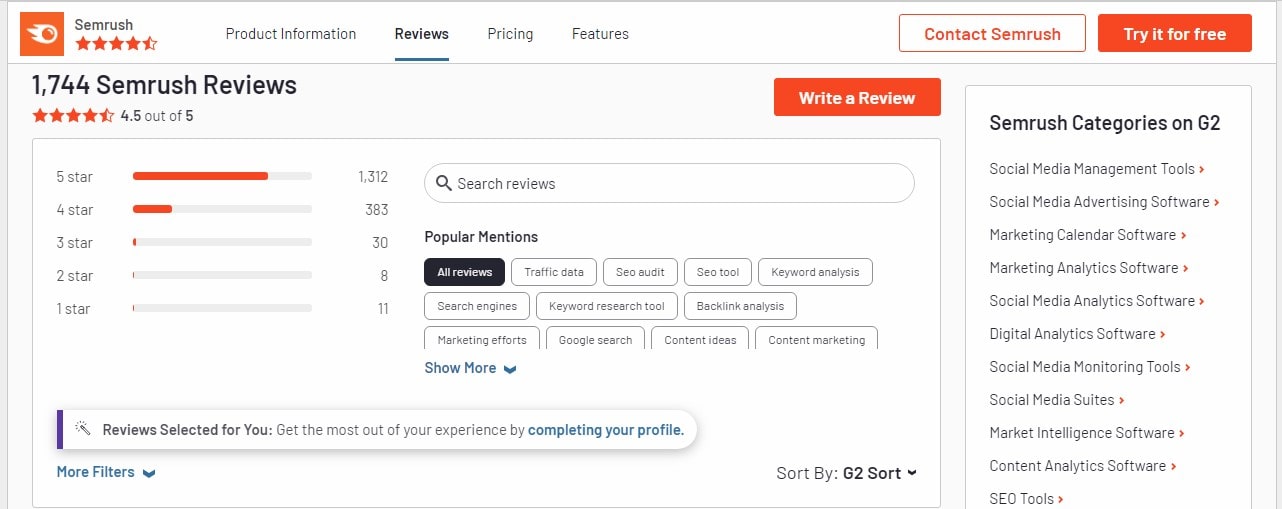
Leading online visibility management SaaS tool Semrush helps companies implement thorough digital marketing initiatives. Based on 1,741 user ratings, G2 has a 4.5/5 rating that is evidence of its adaptability and efficacy.
Semrush covers all grounds, from SEO to content and social media. It suits many sectors, including marketing and advertising tools. It appeals widely; 66% of its users are small enterprises and another 28% fall into the mid-market category.
Semrush’s platform offers exceptional features:
- Provides detailed insights on 808M desktop and 32.1M mobile domain profiles.
- On average, 25 billion URLs crawled daily and a shockingly 43 trillion backlinks.
- 20M original ideas for each of the over 24.3 billion keywords.
- Considered by thirty percent of Fortune 500 corporations as their main marketing weapon.
From seasoned marketing managers and digital marketing experts to SEO enthusiasts, Semrush is a great partner to Ahrefs. Thus, maximize the free entry-level pricing to take use of these features right now.
Pros and Cons of Ahrefs and Semrush
Among tools for SEO, Ahrefs and SEMrush are giants. Each does, however, have particular advantages and disadvantages.
Ahrefs excels with its probably the biggest backlink database in companies. Its easy-to-use interface also helps one to negotiate challenging data. Its lack of PPC data, a feature many digital marketers find essential, is a disadvantage unfortunately.
Conversely, Semrush is a jack-of- all-trades. It provides PPC statistics among an all-inclusive package of SEO techniques. Its keyword magic tool also is a wonder, providing thorough keyword insights. Not all roses, though; some users find its interface disorganized and overpowering.
- Ahrefs: lacking PPC statistics, it has a user-friendly design and extensive backlink database.
- Semrush: All-inclusive search engine optimisation tools, keyword magic tool, messy UI.
Consider yourself engaged in a project on competition analysis. Ahrefs let you quickly search all of their backlinks and find their ranking keywords. But knowledge of their paid advertising depends on PPC data. SEMrush would cover that void but could cause you to search through mountains of data in search of what you need.
Ahrefs are your first choice if your main focus is a thorough backlink study. However, SEMrush might be more suited for you if you’re looking for a complete SEO tool set including PPC data. Consider the advantages and drawbacks and select the one suitable for your SEO requirements.
Utilizing SEO Tools To Track And Improve Your Website’s Performance
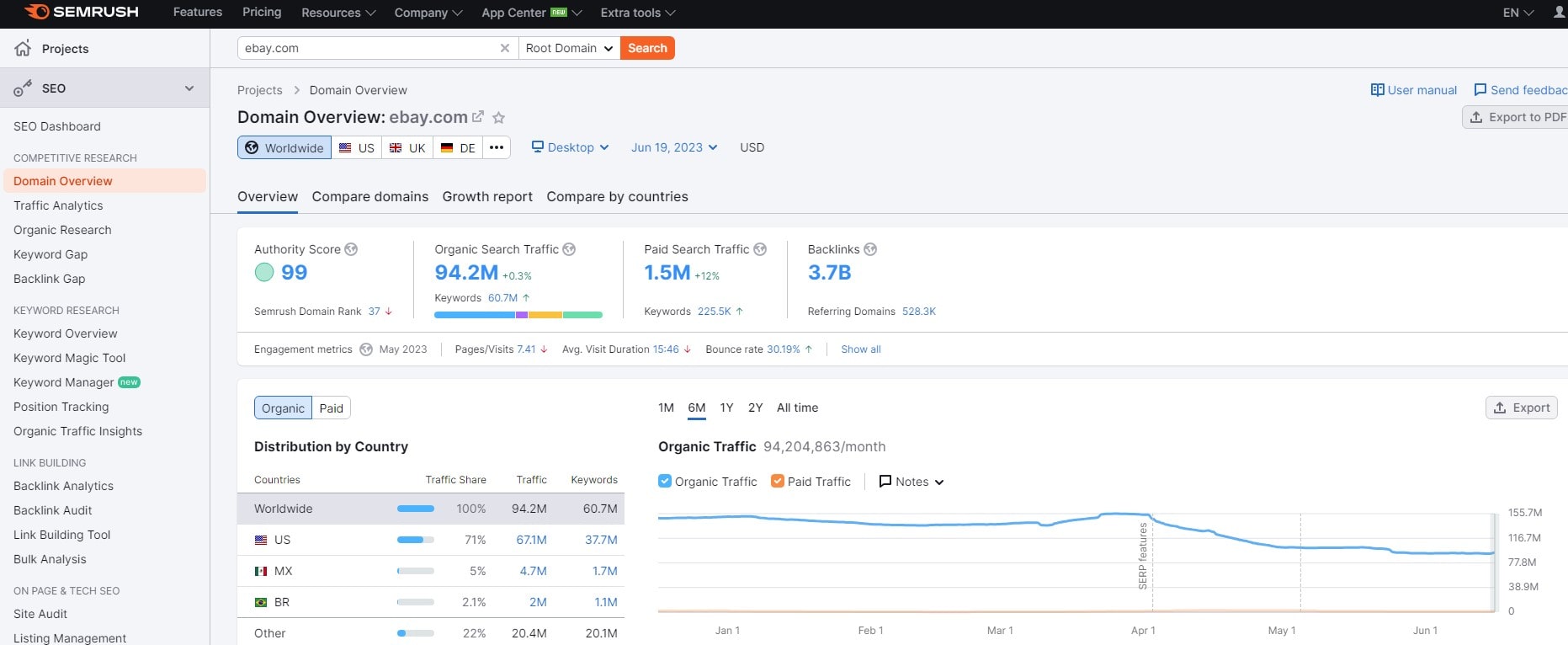
Having top-notch SEO tools like Ahrefs and SEMrush will help your website run as it should. For your SEO trip, they are like GPS; they keep you on target and guide you toward development.
Ahrefs is a reliable compass that leads you throughout the huge backlink terrain. Finding where you’re losing and where you’re acquiring links is easy. It doesn’t work, though, when tracking PPC advertising, which leaves some underprepared.
SEMrush acts to close the void. Covering SEO, PPC, and social media measurements, it is a multi-tool in your SEO toolkit. But be careful; some people find the abundance of info daunting.
- Ahrefs: Perfect for tracking backlinks but lacking PPC info.
- SEMrush: Complete digital marketing tracking, although navigating it might be difficult.
Imagine yourself handling SEO for a small company. Ahrefs let you simply monitor your backlink profile, therefore enhancing your local SEO approach. If you aimed to delve into PPC or social media analytics, though, you would run across limitations. Conversely, SEMrush provides these insights but could leave you mired in a data web.
Simply said, using SEO tools such as Ahrefs and SEMrush will improve the performance of your website. It’s about knowing and using their strengths to fit your requirements, therefore transforming unprocessed data into SEO gold.
Choosing The SEO Tool That Suits Your Specific Needs
Among the busy market of SEO tools, Ahrefs and SEMrush stand out as leaders. The ideal fit, however, is more about the one that exactly meets your particular needs than about the shiniest instrument.
Ahrefs is a strong tool—a titan in backlink analyzing. Its easy-to-use interface guides over the sea of information like a stroll in the park. But the lack of PPC data leaves a void in your toolkit for digital marketing.
By contrast, SEMrush is an all-rounder. It provides a real smorgasbary of insights covering PPC measures and SEO. Its complexity is the drawback, though; it can be a challenge to negotiate.
- Ahrefs lack PPC data but are unmatched for user-friendly backlink analysis.
- Semrush: Complete digital marketing tool, but maybe too much.
Imagine you are an SEO master developing a link-building plan for an online retailer. Your perfect partner would be Ahrefs, who offer unmatched backlink data to support your approach. Ahrefs wouldn’t have your back, though, if you decided to get into PPC marketing. Although with a more steep learning curve, SEMrush would offer these insights.
In the end, your particular requirements will determine which of Ahrefs and SEMrush you need. Both are powerhouses in the realm of SEO tools; it’s about discovering the one that matches exactly. Emphasize your particular objectives and let them lead you to the instrument to realize your dreams regarding SEO.
Conclusion: Which Is the Best SEO Tool?
Between Ahrefs and SEMrush, deciding which SEO tool is best is not a binary choice. Rather, it’s more of a balancing act, a complex ballet of your particular needs, means, and goals.
Ahrefs’s flawless backlink database and user interface raise the standards. If you’re heavy on competitor analysis and link-building, it’s therefore a top choice. Its lack of PPC data, though, creates a blind hole in your marketing plan.
Conversely, SEMrush is a Swiss Army knife of SEO instruments. It covers everything from SEO to PPC to social media. Its abundance of capabilities offers a whole perspective of your digital marketing environment. Be advised, though, its crowded UI can sometimes be a maze.
Imagine this: you work for a startup and are an SEO specialist. Ahrefs may simplify your link-building techniques with their thorough backlink data and simplicity of usage. But PPC data lets you create a well-rounded campaign. Flip the coin; SEMrush could provide you a complete answer, but it could also challenge your navigation ability.
The greatest SEO tool in the last analysis will rely on your requirements. Ahrefs and SEMrush have great capability; your difficulty is choosing the tool suited for your SEO puzzle.
The bottom line is
With so many choices, navigating the SEO terrain can seem like negotiating a maze. Ahrefs and Semrush have been two titans tested on our path today. Following closely the features, strengths, and trade-offs, both tools rank highly in the SEO scene.
Ahrefs excel in offering a large backlink index, thereby enhancing the edge of your site. On the other hand, Semrush fuels your content strategy with its competitive research skills and strong keyword insights.
Turning now toward Plerdy, their UX and CRO analysis tools provide still another level of improvement for your digital plan.?️ They provide a good approach to maximize user involvement, thereby turning traffic into converts.
In the end, try these tools instead of depending solely on our word for it. Most give free trials or restricted versions, thereby giving you a fair sense of what they can offer your digital table. So ready to begin your search engine optimisation trip? Start with Ahrefs and Semrush or even include Plerdy tools into your tech stack! Let us improve your online profile beginning right now.
